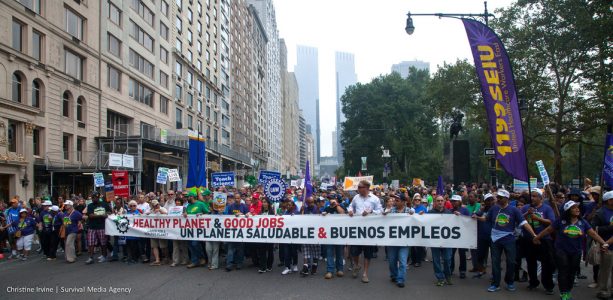“Climate change is a terrible problem, and it absolutely needs to be solved. It deserves to be a huge priority.” Bill Gates
In many ways, climate change, global warming, anthropogenic climate disruption – whatever you want to call it – is old news. Old news in that the science has been definitive for quite a while: humans, most directly through the burning of fossil fuels, are changing the climate.
There is an abundance of evidence and information – studies, reports, factoids, graphs, presentations – readily available to anyone who cares to look for it. For example NASA, the Environmental Protection Agency, and the Intergovernmental Panel on Climate Change are good sources of information.
We don’t have every answer about what is happening in our complex climate system, or what all the specific consequences and their timing will be, but we do have a decent idea of what the future will look like if current trajectories are not altered. It is a frightening picture, almost inconceivable.
There is also plenty of information documenting the misinformation being perpetuated by so-called climate deniers. One is the website Skeptical Science, and another is the book and website Merchants of Doubt.
The big question is what can we do about climate change? Bill McKibben addresses this question in an October 14 blogpost. He modifies the question though: What can we do that actually makes a difference?
Like many others, McKibben has come to the conclusion that our individual actions, things like eating lower on the food chain, conserving energy, water, and other resources, including driving fuel efficient or alternative fuel vehicles and so on, are gestures. Worthy gestures worth doing, but gestures just the same.
By themselves all the individual actions taken by citizens will never make a meaningful enough difference. Individual actions are important but insufficient, and that is the hard truth.

The 2014 People’s Climate March in New York City was the largest ever climate march with over 300,000 people participating. Photo credit: Christine Irvine with Survival Media Agency.
What we can do that will make a difference is educate ourselves, and organize. We can come together as citizens and build movements. Making a difference requires new policies, laws, investments, incentives, and these things will happen only when the organized power of citizens is activated and applied through advocacy to achieve what is needed.
In many ways the engagement infrastructure already exists. For example, Citizens Climate Lobby (CCL) is a well-organized, thoughtful effort focused on a market-based approach to lowering emissions. CCL is organizing in every congressional district in the nation, and meeting with federal legislators everywhere. This is CCL’s mission statement: “We exist to create the political will for climate solutions by enabling individual breakthroughs in the exercise of personal and political power.” Check out their ideas online where you can also get information about joining or forming a local group to participate in this citizen movement.
350.org is another citizen-based effort to tackle climate change by “…building a global climate movement: climate-focused campaigns, projects, and actions led from the bottom up by people in 188 countries.” You can sign up at the 350.org website to participate by email.
It is important to remember that while we may be motivated by the dire threat that climate change presents, we are best served by facing this challenge through the opportunities it presents to transition to clean and unlimited sources of energy, increase security and wellbeing for all people, and significantly reduce the threat of climate change. As Amory Lovins puts it: “The many crises facing us should be seen…not as threats, but as chances to remake the future so that it serves all beings.”
That’s the whole point of sustainability.





Please talk to Alabama’s State Climatologist, Dr. John Christy before you talk about global warming. Data from researches in global warming manipulate their data to keep the funding coming in. NPR recently did a story on measuring temperatures on the ocean’s surface. This comes from National Public Radio! Bouys all over the world record temps at the ocean’s surface. Freighters also record temps. There is a difference in these temps. Freighter’s temp are slightly warmer than temps recorded by bouys at the ocean’s surface. Bouy temps were used now freighter temps are used. Whamo! Temps have warmed. This looks better for the global warmers.
Dwain,we appreciate you reading our monthly digest. The science of climate change and its causes is well established. There is no legitimate debate about the causes of climate change – humans burning fossil fuels and overwhelming the Earth’s ability to absorb excess greenhouse gasses – any more than there was a legitimate debate about the science of the relationship between smoking and cancer, even tho the pseudo-debate went on for 40 years. If you want to read what’s behind the denial movement I suggest the book Merchants of Doubt by Naomi Oreskes and Erik Conway.